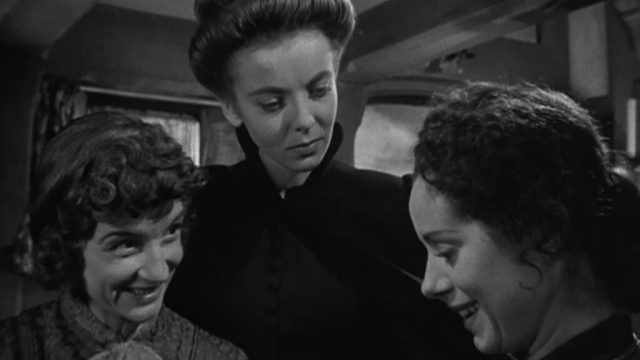I always appreciate films that translate the noir sensibility to times, places, and situations that don’t often see that treatment, and Charles Vidor’s Ladies in Retirement is an excellent example of the breed.* This is rural Victorian noir, where the vise slowly tightens on a murderer’s soul and there are bustles galore.
Ida Lupino stars as Ellen Creed, who serves as companion and housekeeper to retired chorus girl Miss Fiske (Isobel Elsom). Together with maid-of-all-work Lucy (Evelyn Keyes), they form a not-unhappy household in Miss Fiske’s cozy, if isolated, home.
The class valences in Lades in Retirement are interesting, and the movie balances them adeptly. Miss Fiske is the one with money, but Victorian chorus girls, aged or otherwise, are not “ladies.” She isn’t from a genteel background, so her money comes not from family but from past “friends”: in essence, Miss Fiske is retired not only from the stage but from a kind of discreet sex work. She’s been a mistress, and her former lovers have set her up handsomely enough. She’s happy, but she feels a pang over not being quite “respectable.” She’s also Catholic in a largely (and officially) Anglican England.
Ellen, on the other hand, does come from a respectable background. She and her sisters–Emily (Elsa Lanchester) and Louisa (Edith Barrett)–have fallen into genteel poverty, but they’re used to better things; they have a history of them, and to some extent feel an entitlement to them. The best furniture in Miss Fiske’s house are old Creed family pieces pieces she bought from Ellen’s curio shop, before Ellen came to work for her.
It makes Ellen’s sisters feel right at home, when they too come to stay. It’s almost like this is their place, not Miss Fiske’s. They can’t help thinking: Shouldn’t it be theirs? Wouldn’t it be more right if it were?
Louisa and Emily are, in the film’s Victorian framing, “mad.” I’d say in modern terms they’re closer to neurodivergent than mentally ill, but honestly, this is movie neurodivergence, so it’s easiest to think of them as “odd and a bit difficult: whimsical edition” (Louisa) and “odd and a bit difficult: intense/obsessive edition” (Emily). As the movie opens, their current landlord has written to Ellen to get them out at once, and Ellen, with no other options, gets her employer agree to let them come for a visit. It’s a casual drop-in, just so they can see the life she’s written to them about! Well, fine, it’s short notice, but Miss Fiske agrees that of course they can come for a day or two. Six weeks later, they’re still there, scratching up furniture and leaving heaps of wood on the kitchen floor because Emily wants to clean up the marshes. It’s safe to say they’re not exactly gracious guests, especially since they clearly think they’re above her and see no reason to take her wishes into account. Miss Fiske’s fraying patience snaps, and she tells Ellen to get them out and go with them.
Ladies in Retirement keeps things tense and uneasy, with no sure place to put our sympathy. It’s a have vs. three have-nots, but it’s also three ladies looking down on a “disreputable” woman whose past and social standing means they don’t really respect her. She has, and they feel having is their birthright. She’s miserably indefinitely hosting two women she’s come to actively dislike, which seems fair enough, but they truly have nowhere else to go. Miss Fiske can call the sisters crazy, and Ellen can all but say that at least no one in her family is a whore.
But Ellen is the most desperate, and that means she’s the one to act. After setting up one flimsy story to shield herself from public suspicion and another flimsy story to reassure her sisters, she strangles Miss Fiske. This is noir, where all social pressures are ultimately only vented the one way: the steam is always murder.
Of course, that isn’t the end. Ladies in Retirement then turns to how Ellen’s increasingly brittle conscience can survive her crime–and whether or not she can get away with it at all, especially once a new ne’er-do-well relative, the charming, sleazy, and cunning Albert (Louis Hayward) begins sniffing around. The movie goes to some good places after its violent turning point–I especially like a Hamlet-esque bit of Albert’s scheme and the use of Miss Fiske’s home altar, as well as the greater focus on Lanchester’s Emily–but nothing quite matches the stress and moral ambiguity of its first act, where it doesn’t feel like there’s a good, fair answer to anyone’s problems beyond “make England’s welfare state arrive about a century earlier.” The ultimate resolution, too, is a little forced and saccharine. Nevertheless, Ida Lupino’s performance throughout is superb and haunting, and she’s surrounded by more-than-able co-stars who also keep this riveting. I haven’t seen this talked about very often, but if you want an unconventional addition to your Noirvember, check it out.
* It also feels a little like a Victorian sensation novel, which I like almost as much as I like film noir.
Ladies in Retirement is streaming on the Criterion Channel, Roku, and Amazon Prime.


